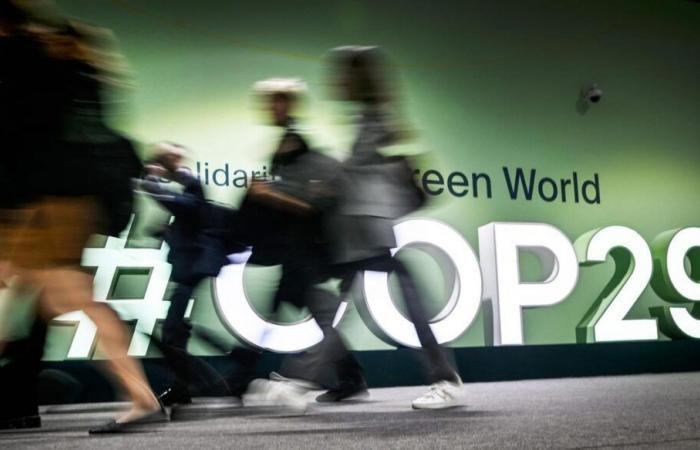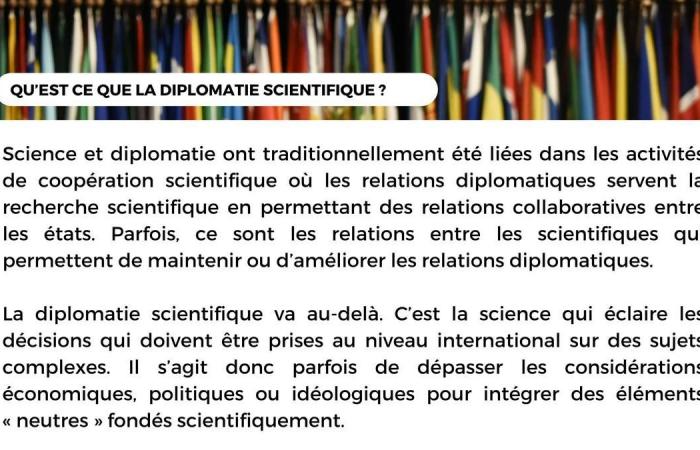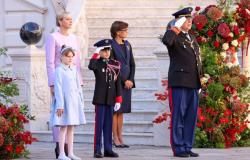The climate COP is a global event which brings together each year for a few days the greatest diversity of actors: representatives of states, dignitaries of indigenous populations, lobbyists, philanthropists, journalists, members of non-governmental associations, political leaders and… some representatives from the academic world, mainly researchers.
Provided by the author
Negotiations that run throughout the year and decisions taken by consensus
If, in the media, the COP only seems to take place a few days a year, the negotiations in fact begin well before the conference. Indeed, it is throughout the year that national positions are developed, often based on the Nationally Determined Contributions (NDCs) provided for in the Paris Agreement and defining the efforts made by each country to reduce its national emissions and adapt to the effects of climate change. The COP then begins with plenary sessions, followed by thematic working groups (finance, adaptation, etc.). At the same time, informal consultations, behind closed doors and in small groups, are also carried out to resolve impasses.
Decisions are made by consensus of the 198 parties represented (197 signatory countries plus the European Union), meaning that an agreement must be acceptable to all, even if it does not fully satisfy each party. The final texts are then submitted for approval in plenary session and may include specific mechanisms, for example the carbon market.
How is the host country chosen?
The country hosting, and therefore presiding the COP, plays a key role in the negotiations by facilitating dialogue between the parties, including proposing compromises towards a final agreement.
He is chosen by rotation from five United Nations groups: Africa, Asia-Pacific, Eastern Europe, Latin America and the Caribbean, and Western Europe. Countries are invited to submit their applications while the final decision is made by consensus among member countries.
In addition to geographic rotation, the host country must meet logistical and security criteria. Finally, although the application is not exclusively reserved for exemplary climate countries, hosts must demonstrate their commitment to climate actions.
Latest COPs focused on loss and damage and the first assessment of the Paris Agreement
During the last two editions of the COP, important work was completed with the establishment of the loss and damage fund, discussed at COP27 and voted on on the first day of COP28 (Dubai, UAE, 2023). It provides for a contribution from the richest countries to a fund operated by the World Bank and aimed at compensating the countries most affected by climate change.
Even if this fund has so far received a very insufficient allocation in relation to its needs, it is a first step in recognizing the harm resulting from climate change and the implementation of an international solidarity mechanism. The first call for contributions totaled around $700 million, and France pledged more than 100 million euros.
Another highlight of COP28, the presentation of the first global assessment: the roadmap decided at COP21 plans to take stock every 5 years of the collective progress made to achieve the objectives of the Paris Agreement with regard to mitigation, adaptation and protection (e.g. against sea level rise) and means of implementation. For the record, global emissions must be halved by 2030 to meet the Paris Agreement.
In Dubai in 2023, the joint declaration finally adopted indicated, on the most controversial subject of fossil fuels, the need to “move away from fossil fuels in energy systems, in a fair, orderly and equitable manner, by accelerating action during this critical decade, to achieve carbon neutrality by 2050, in line with science. »
At COP29, fewer scientists present?
With the selection of Azerbaijan as the host country of COP29 which will be held in Baku from November 11 to 22, 2024, many questions have arisen, once again, regarding the choice of a country whose economy is significantly based on the exploitation of fossil resources. Unlike the United Arab Emirates which organized COP28 in Dubai on the site of the 2020 Universal Expo and which ultimately brought together more than 100,000 participants, the infrastructure in Baku cannot accommodate as many participants. This has led to a considerable reduction in the number of accreditations made available to observer organizations, including the few higher education and research establishments active during the COPs.
Indeed, the initial allocation of quotas for COP29 saw a substantial decrease (nearly 40%) compared to the previous edition. On the other hand, a notable effort has been made to ensure that all regions and groups are represented. For example, a greater number of accreditations have been granted to so-called Southern universities. Similarly, beyond accreditations, the flags worn by universities were not selected for the blue zone this year.
However, it is these establishments that are undoubtedly best placed to develop the training, knowledge and technologies essential to the fight against climate change and adaptation to its consequences. The role of science is essential in providing answers to these major challenges. In this context, universities around the world, major centers of science where research and innovation take place, will have more difficulty making their voices heard. They will still be able to count on the Alliance of Azerbaijani Universities for Climate, supported by the presidency of the COP, which was made official during the Baku climate week.
On the program for this COP29, we will otherwise find subjects such as increasing international financing for the fight against climate change, the gradual elimination of fossil fuels and the expansion of emission rights at the global level.
The need for multilateralism
The environment is a whole that knows no boundaries; air masses move according to atmospheric pressure conditions, aqueous systems are interconnected, and the water cycle includes all three physical states. This is how this substance travels from snow-capped peaks to rivers, seas and oceans before evaporating to form clouds. The implementation of isolated local actions is therefore very unlikely to lead effectively to the moderation of climate change and adaptation to its consequences. It is therefore through the establishment of a multilateral dialogue that global solutions can be envisaged. In other words, sit everyone around the table to integrate everyone’s knowledge, constraints, needs and aspirations.
Provided by the author
To fuel exchanges between negotiators on these complex subjects, science must both make its lessons accessible to as many people as possible while adopting scientific approaches specific to understanding global issues.
But the paradigm shift that has taken place since Galileo regarding our place in the universe calls in particular for transdisciplinary approaches allowing the aggregation and interconnection of knowledge when addressing difficult questions about necessarily complex objects or systems. by their nature and diversity. Where traditional disciplines can be defined by observable or formalized objects, specific methods and procedures, transdisciplinarity favors a multi-level approach, coordinated towards a common goal.
As sociologist Edgar Morin points out, this has played a fruitful role in the history of science, and remains more crucial than ever to address an issue as global as that of the climate. Global warming linked to the increase in carbon dioxide in the atmosphere (greenhouse effect) was first theorized by a chemist (the Swede Svante Arrhenius at the end of the 19th century). But the fight against global warming involves questions of global governance, law, sociology, agronomy, and energy, which can be the subject of studies in many other disciplines.** different transdisciplinary approaches also make it possible to evolve towards more inclusive, dynamic and collaborative knowledge transmission models, which enrich knowledge and research processes. Transdisciplinarity thus represents an opportunity for the resolution of complex environmental challenges such as climate change, discussed at the international level during the COPs.
On the eve of the official opening of COP29 in Azerbaijan, and following preparation throughout the year, the place of science as a guide in assessing the situation and designing adaptation measures and limitation of climate change must however be further strengthened, in accordance with the explicit mention of this during the final declaration of COP28 (see above).
Higher education and research institutions are places of knowledge production, innovation development, training and transmission. Scientists are naturally experienced in contradictory debate, in the search for elements of understanding and prediction allowing the development of the most relevant, neutral and objective solutions or visions. They must therefore play a more important role in the debates, in supporting negotiators and in informing political decision-makers. Thus, decision-making based on scientific knowledge must no longer be an option but an obligation in the common interest of all humanity.







